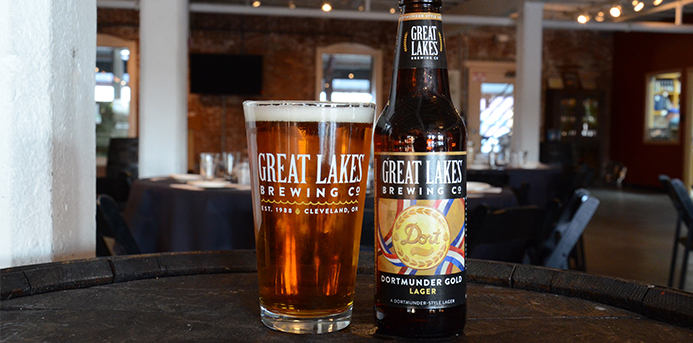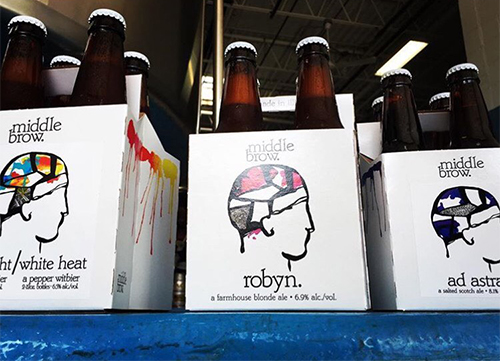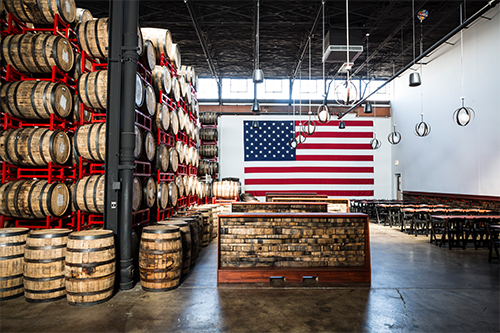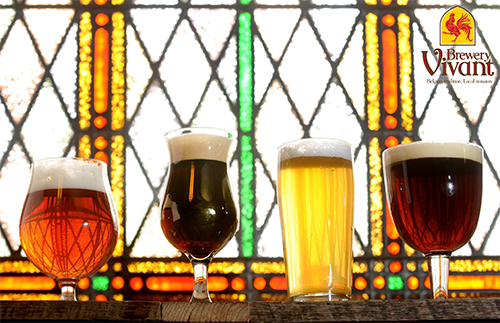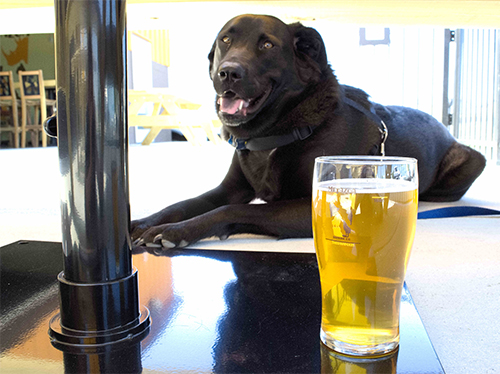Whether it’s through an ongoing effort to make their community a better place or a one-off program with a big impact, here are some of the Chicago-area and Midwestern breweries giving more to their communities than hangovers.
Chicagoland:
Middle Brow Beer Co.
Not many breweries have made charitable giving as big a part of their platform as Middle Brow Beer Co., who has been making beer since 2013 and donating a part of the proceeds for just as long. The brewery donates a full 50 percent of the profits from their beer sales to a rotating variety of charities including Cure Violence, Lurie Children’s Hospital and the Immigration Youth Justice League.
Even better than the good karma you earn every time you crack open one of their bottles is the fact that their recipes are righteously creative — highlights include Keep it Copacetic cream ale, inspired by elotes and brewed with popcorn, lime and ancho chiles, and White Light/White Heat four-packs, which feature two different witbiers, one made with apricots and the other with peppers and spices, for drinkers to enjoy separately or to blend together for a brand new flavor experience.
Wild Onion Brewery / The Onion Pub
The team at Wild Onion has been in the suburban beer game since the mid-90s. They’ve taken production of their beers like Paddy’s Pale Ale and their pumpkin ale from a small-production brewery, to a brewpub and finally to an even bigger production facility in Barrington. Along the way they acquired a 20-acre patch of land — a former gravel quarry — that they completely cleaned and revitalized, adding wildflowers and prairie grasses and turning it into green space and a small hop farm.
Fixing the land they owned was only the first part of the company’s Green Initiative, which includes numerous energy and water efficiencies. Owner Mike Kainz, a former Peace Corps volunteer, donated 4.5 acres of the land back to the Citizens for Conservation in early 2016, expanding the Flint Creek Savanna Reserve to 151 acres of wetlands.
Revolution Brewing
Some breweries give away beer for events and good causes. Other breweries make beer specifically to help raise awareness or benefit a particular organization. Revolution Brewing, one of the nation’s biggest craft brewers and the city’s largest independent brewer, does both. In addition to helping support area nonprofits through direct donations of their beer, their Penguin Hops program helps support one of the city’s most beloved civic institutions — the Shedd Aquarium.
Did you know that the Shedd houses a hop farm on site? For the past four years the Revolution team has used those hops to brew a special Penguin Hops beer (an IPA, naturally) named after the aquarium’s Rockhopper penguins. The beer is a harvest ale, made from fresh hops harvested in mid-autumn, and $1 from every pint sold goes straight to the Shedd, totaling more than $10,000 through the years.
Goose Island
When Goose Island’s Green Line pale ale was introduced in 2010, it was initially a Chicago-only product made exclusively for draft lines. Since the beer didn’t go far and didn’t use any cans or bottles, the “green” in Green Line stood for those efforts toward sustainability and efficiency. It also included a program of giving back — the brewery’s ongoing “Buck a Barrel” program donates money for each barrel of Green Line sold to the Trust for Public Lands and the 606 Trail.
Now that the beer is sold nationwide and is available in bottles and cans, that draft-only efficiency has been lost, but it’s made up for by the sale of more beer. This has allowed the Goose sustainability team, led by assistant brewing manager Ian Hughes (who also describes himself as “resident treehugger”), to donate more money to the Alliance for the Great Lakes as well as the ongoing Green Line giving program.
Additional sustainability efforts include offsetting electrical consumption by investing in renewable sources of electricity and instituting a glass-recycling program. The brewery also pays it forward by donating proceeds from the sale of tickets to their annual Sunday Funday to Special Olympics.
Lagunitas
Lagunitas has happily donated beer to organizations for years, and their onsite fundraising efforts are often big revenue sources for the groups who can get on the brewery’s busy schedule. On select Monday and Tuesday nights throughout the year, the Lagunitas team hosts private events in their taproom for nonprofit groups who then receive money for every pint of beer sold that night. Organizations can sell tickets to the events for extra revenue, and with the space holding up to 300 guests, it can make a major impact on an organization’s bottom line.
MillerCoors
Okay, so they aren’t making beer in Chicago and no one is going to mistake Miller Lite for a craft brew. However, MillerCoors’ national offices are right downtown, and it’s there that the company’s environmental efforts are coordinated, which is good enough to earn them a mention here — and there’s plenty to be commended. Every one of their breweries is completely landfill-free; they turn their extra beer into ethanol; and they recycle basically everything, so you can certainly feel better about drinking that 12er of High Life.
Around the Midwest:
Brewery Vivant, Grand Rapids, Michigan
Sustainability is a major focus for many breweries, since it’s equal parts good deed and good business: When you use less water and energy, you spend less money and you benefit the environment. (Brewing beer takes a LOT of water, too — it can take five gallons of water to brew one gallon of beer.) Brewery Vivant takes it to the next level.
Named the first LEED-certified brewery in the country in 2012, their annual Sustainability Report breaks down in minute detail just how determined they are to buy local, farm their own foods where they can, rack up employee volunteer hours, reduce their carbon footprint — the list goes on. (They even produce the PDF version of the report in all black, in an effort to prevent people from printing it out and wasting a ton of ink. Sneaky, but smart.)
Honestly, they could probably set tires on fire for fun every afternoon as long as they keep churning out beers like their Triomphe Belgian IPA and Farm Hand French Style Farmhouse Ale, but if they’re going to be as hardcore about environmental efforts as they are about making good beer, then even better.
Great Lakes Brewing Company, Cleveland, Ohio
For a beer company so strongly associated with a city whose river was once so polluted it caught fire (an event memorialized by the brewery’s Burning River Pale Ale), it’s not surprising to find that Great Lakes puts a strong focus on sustainability, waste reduction and other environmental efforts. Most notable is their Great Lakes Burning River Fest, a music (and beer) festival that gives back to environmental causes.
Since starting the festival in 2001 and expanding into a full-on foundation in 2007, the fest and the Burning River Foundation have donated more than $320,000 to organizations that help protect fresh water. And since the water they brew with comes from Lake Erie, it’s a project that impacts you every time you crack open an Elliot Ness Amber, a Turntable Pils or an Edmund Fitzgerald Porter.
Surly Brewing, Minneapolis, Minnesota
You might think an aggressive brewery like Surly would be interested in creating only the most extreme beers (with names like Abrasive, Furious and Hell) and little else, but believe it or not, Surly gives a damn. No, really, that’s the name of their charitable outreach program: Surly Gives A Damn.
Through the program, instituted in 2010, they’ve organized events by the dozens to benefit local parks, donate blood, paint houses, pack food for the hungry, and more. The organization is active in two states (they’ve expanded from Minnesota into North Dakota) — and yes, they also donate plenty of beer.
Metazoa Brewing Company, Indianapolis, Indiana
Much like Middle Brow, Metazoa bakes their giving efforts into every beer they sell, with 5 percent of their profits going to benefit animal and wildlife organizations around the Indianapolis area and far beyond. The animal-friendly brewery features animals in their logo and in their beer names (like the Giraffe Dance American Pale Ale and the Kinkajou Honey Weiss). Even the name Metazoa refers to all multicellular creatures, so it makes sense that they’re focused on supporting a range of animal-welfare organizations from the African Wildlife Foundation to the Planet Bee Foundation.
More from Make It Better:
